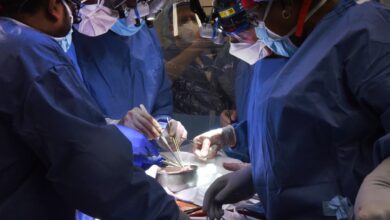NHS braced for ‘worst’ chaos ahead as strike knock-on effect hits hospitals

The NHS is braced for more chaos as the knock-on effect of two consecutive strikes by frontline workers combines with rising winter pressures, health leaders have warned.
Tens of thousands of ambulance staff walked out on Wednesday, with almost all of the ambulance trusts in England declaring so-called critical incidents and many trusts stating that they were facing huge pressure even before strikes began.
Senior health figures have said the “fallout from strike action is likely to spill over into the coming days” with high levels of emergency demand from patients who have delayed seeking care.
In addition, the disruption has also meant patients have not been discharged from hospital at the normal rate.
One NHS director in South West England said the situation has been “dreadful all week … the next few days will be key and the perception is [it is] the worst the NHS has ever seen, not helped by lots of Covid, flu, and [respiratory viruses]. General Practice [has been] broken with Strep A.”
As the fallout from the strikes began, a war of words between health secretary Steve Barclay and unions broke out with both sides accusing the other of endangering lives.
Mr Barclay accused trade unions of making a “conscious decision” to “inflict harm” on patients as thousands strike over disputes about pay, staffing and working conditions.
Rachel Harrison, national secretary at GMB union, responded: “Ambulance workers are seething at such a crude, insulting attempt to divert attention from the government’s continued chaos in the NHS.”
There appeared to be no sign of an agreement with the government seizing on a leading health union’s rejection of a “very generous” pay offer in Scotland to justify its refusal to reopen negotiations in England.
Christina McAnea, the general secretary of Unison, said fatalities would “absolutely” be the fault of ministers who have refused to negotiate pay. “It’s completely irresponsible of them to refuse to open any kind of discussions or negotiations with us,” she said.
Another trust chief said: “I’m frightened about tomorrow because there are far fewer walk-ins today, ambulance is much more manageable, and I think there are lots of poorly people that are not accessing healthcare today that will tomorrow and just has me thinking “by God what’s it going to be like”.
Fears were also raised that patients will be stuck in hospital for Christmas, having a knock-on impact in early January.
A trust executive told The Independent: “The next few days are going to be exceptionally [challenging]. It also means we are unlikely to get the discharge ‘Christmas miracle’ effect – which makes heading into January even worse.”
NHS Providers interim chief executive Saffron Cordery said: “We have seen varying levels of disruption across the country with some 999 demand shifting to other services or not materialising as expected.
“Trust leaders and their teams have done everything in their power to ensure patients receive safe care, but it is becoming increasingly difficult to do so. Despite their best efforts, we have also heard reports of leaders and their staff feeling a sense of helplessness and moral injury at not being able to help everyone who needs the NHS and the care it provides.”
She added: “Leaders across the NHS also know that as this week’s strike action draws to a close, the disruption is far from over. The fallout from strike action is likely to spill over into the coming days due to the knock-on impact across different parts of the health and care system, the need to reschedule … appointments, and the anticipation of a return to very high numbers of emergency calls. There is particular concern about patients who may have delayed seeking care – and whose conditions have deteriorated – now coming forward for treatment.
“They are once again reiterating their call for urgent, serious talks – including on pay – between health ministers and unions to avert more strikes in the future.”
A Department of Health source told The Independent the RCN had rejected a “very, very generous” pay deal from Nicola Sturgeon in Scotland.
“If you implemented it in England it would cost around £13bn a year,” the source said. “It begs the question how can we have a reasonable conversation? You have to ask, are they really standing up for the interests of ordinary nurses?”





